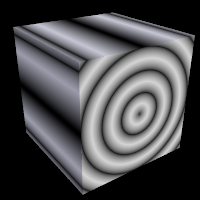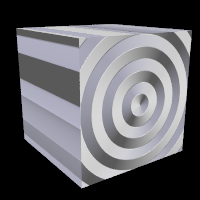Difference between revisions of "Reference:Wood Pattern"
Jump to navigation
Jump to search
Jholsenback (talk | contribs) m (1 revision: Initial Load (TF)) |
Le Forgeron (talk | contribs) |
||
| (One intermediate revision by one other user not shown) | |||
| Line 14: | Line 14: | ||
<p>The <code>wood</code> pattern has a default color_map built in that results | <p>The <code>wood</code> pattern has a default color_map built in that results | ||
in a light and dark brown pattern with sharp transitions.</p> | in a light and dark brown pattern with sharp transitions.</p> | ||
| + | |||
| + | <table class="centered" width="420px" cellpadding="0" cellspacing="10"> | ||
| + | <tr> | ||
| + | <td>[[Image:RefImgWoodPigment.png|center|200px<!--centered--->]]</td> | ||
| + | <td>[[Image:RefImgWoodNormal.png|center|200px<!--centered--->]]</td> | ||
| + | </tr> | ||
| + | <tr> | ||
| + | <td colspan="2"><p class="caption">wood pattern used as pigment and normal respectively</p></td> | ||
| + | </tr> | ||
| + | </table> | ||
Latest revision as of 09:57, 1 March 2014
The wood pattern consists of concentric cylinders centered on
the z-axis. When appropriately colored, the bands look like the growth rings
and veins in real wood. Small amounts of turbulence should be added to make
it look more realistic. By default, wood has no turbulence.
Unlike most patterns, the wood pattern uses the
triangle_wave wave type by default. This means that like marble, wood
uses color map values 0.0 to 1.0 then repeats the colors in reverse order
from 1.0 to 0.0. However you may use any wave type.
The wood pattern has a default color_map built in that results
in a light and dark brown pattern with sharp transitions.
wood pattern used as pigment and normal respectively |
|

